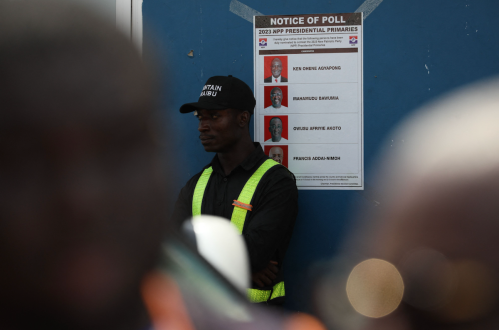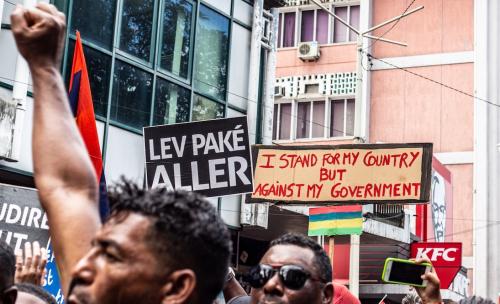Much has been written about Haiti since the massive earthquake devastated the country three years ago this week. Hundreds of evaluations and thousands of reports have been written by the humanitarian community and many more by other actors. I took a quick look at our own website and was surprised to find that in the last three years I have written 18 blogs, articles and op-eds on Haiti and our small project has organized 6 events to debate issues related to Haitian relief and recovery.
And now there’s a fresh outpouring of editorials and reports about what went wrong in Haiti – more specifically what went wrong with the humanitarian response. I’m presently 90 pages into a brand-new book, The Big Truck That Went By: How the World Came to Save Haiti and Left Behind a Disaster. While it is a gripping read, I can already tell that the story will have a bitter ending.
Everyone is critical about the mistakes that were made, the lack of results and the agonizingly slow pace of recovery. In part, this is because the needs in Haiti were so desperate and displayed in vibrant color in our living rooms, but also perhaps due to residual Western guilt about past failures in Haiti. But the criticisms are also related to the unprecedented outpouring of generosity. Governments pledged almost $10 billion (although almost half has not been disbursed and a lot of the money went to support projects that were already in the pipeline). Ordinary citizens around the world dug deep into their own pockets to support Haitian relief efforts. One out of every two Americans personally contributed money for relief. The fact that the recovery hasn’t gone well seems like a betrayal to individual donors who gave generously in the expectation that their aid would make a difference.
I went back and looked at the opinion piece I wrote a few days after the 2010 earthquake, “three keys to relief in Haiti.” I was a bit surprised to find that I still agreed with what I wrote then, in particular in my call that the relief effort:
1. Strengthen Haiti’s government
2. Support Haiti’s community groups
3. Let the United Nations take the lead in coordinating international relief
Much of the critical commentary today focuses on the lack of involvement of the Haitian government and the exclusion of Haiti’s community groups from the process. The Haitian government simply did not have the capacity, nor perhaps the will, to make the decisions needed to enable effective relief and recovery. From securing sites to dumping rubble to dealing with land tenure to providing a development framework into which international assistance should fit – the Haitian government couldn’t make the decisions which were desperately needed. While some Haitian community groups were strengthened, too often international agencies chose to set up their own programs rather than work through existing community structures. Once again, the dominant perception seems to be that internationals ran roughshod over Haiti. While the UN tried valiantly to set up effective coordination mechanisms, I haven’t heard anyone, including my UN colleagues, argue that the relief effort in Haiti was well-coordinated. The fact is that the media attention and the outpouring of support made the disaster too high-profile for donors and private groups to submit to the discipline that meaningful coordination requires.
If I were writing this today, I would add a fourth “key to relief”:
4. Don’t promise too much.
Expectations about Haitian relief and recovery were high. “Build back better,” was the motto. Not only were people going to be rescued from the rubble and receive medical treatment, food, water and clothing – but Haiti would be transformed by the recovery effort. Past inequities would be addressed. The country’s failed infrastructure would be replaced. Haiti would be “built back better.”
We promised too much. Lofty aspirations create expectations and when those expectations are not met, the disappointments are all the greater. The fact is that there was no way that humanitarian actors could deliver on all those promises. Humanitarian agencies are very good at delivering relief quickly and effectively. They are getting better and better. But the problems in Haiti after the earthquake were not primarily the result of the earthquake, but rather the result of centuries of political turmoil, lack of development, entrenched interests.
A fundamental dilemma in disaster response is the tension between the natural impulse to respond quickly and doing things right. For example, in the case of Haiti (and most other disasters), people want housing built as fast as possible. After all, people are exposed to the elements and when the money is available and the need is so urgent, why not just build new homes and worry about the details later? But the details matter. Building new houses on land where ownership is unclear is a recipe for disaster down the road. In Haiti doing things right meant not only fixing the land tenure system, but also developing building codes, revitalizing the judiciary, changing public perceptions of the role of government – these are not areas where humanitarian agencies have expertise. These are not things that can be done quickly. Fundamentally, they are not things that the international community can do although they can support governments to do them. Even in the United States with all of its resources, recovery after Katrina took far longer than three years and many would argue is not yet complete.
When the next disaster occurs, let’s lower expectations of what we expect from humanitarian response. Let’s take seriously the need to engage development actors from the beginning of emergency response. Let’s deliver more than we promise. Let’s expect our humanitarian responders to provide immediate life-saving relief to desperate people and let’s expect our agencies specialized in long-term development to step up much earlier. Let’s re-orient our aid programs to strengthening the government of the affected country – even if that slows things down. Let’s channel more of our funds through community groups so that they become more effective in their own communities – even if that means changing our priorities. Let’s demand that the agencies delivering relief – whether USAID or Oxfam or a Haitian-American congregation in Queens – participate in coordination mechanisms. And let’s keep plugging away to make our coordination mechanisms more inclusive and more effective. We can do better than we did in Haiti, but let’s not promise things we can’t deliver.
The Brookings Institution is committed to quality, independence, and impact.
We are supported by a diverse array of funders. In line with our values and policies, each Brookings publication represents the sole views of its author(s).



Commentary
Haiti Three Years On: Overpromised and Underdelivered
January 10, 2013